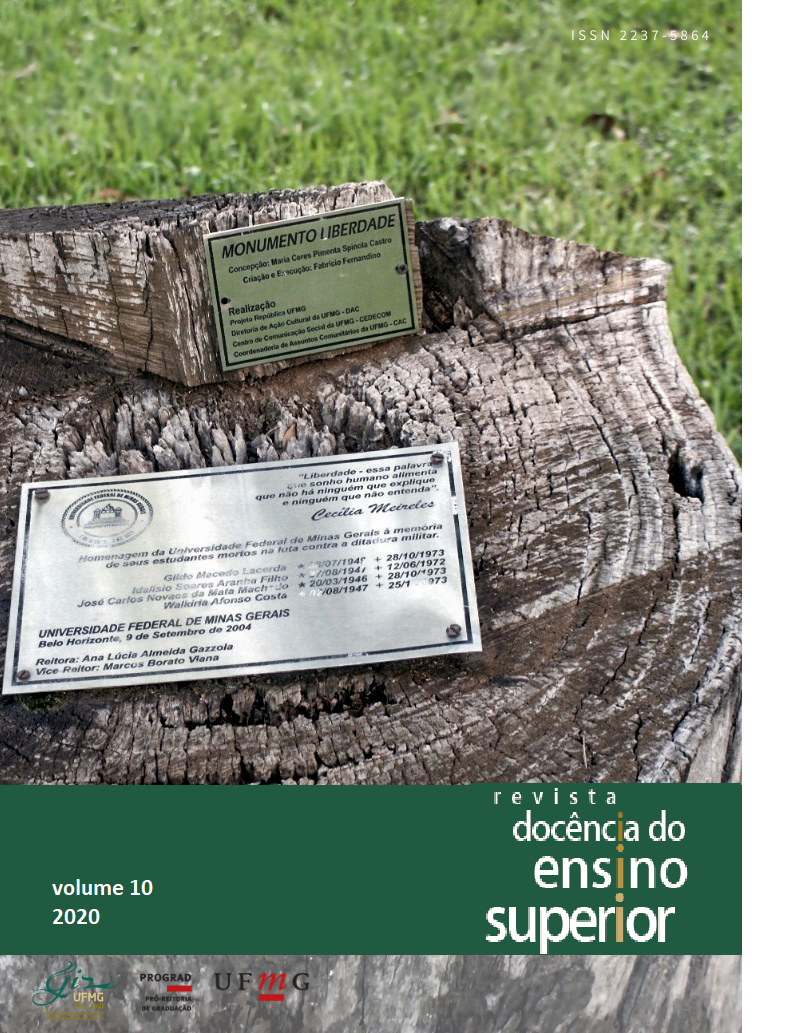Experience reports of digital technologies deployment in Engineering education
DOI:
https://doi.org/10.35699/2237-5864.2020.15139Keywords:
Project-based learning, Engineering teaching, Remote access laboratory, Educational websitesAbstract
Engineering education has been widely rethought, discussed and modified, having as one of its main focuses the development of active, cooperative and project-based learning. This paper discusses alternative learning methodologies, based on the pedagogical implementation of digital technologies in Engineering education, aiming to make both students and teachers into common and collaborative agents in the search and building of knowledge. The Unitary Operations Laboratory, from the Undergraduate course in Chemical Engineering at the Federal University of Minas Gerais, has been developing some changes to transform the teaching-learning process of its students. Such modifications are based on inclusion projects of cyborg tools, which increases the importance and interest in the product development, as well as intensifies other forms of access to information besides those presented by the teacher.
Downloads
References
ABRANCHES, Sérgio. A era do imprevisto: a grande transição do século XXI. São Paulo: Companhia das Letras, 2017.
BAKER, J. Wesley. The “Classroom Flip”: Using Web course management tools to become the guide by the side. In: INTERNATIONAL CONFERENCE ON COLLEGE TEACHING AND LEARNING, 11., 2000. Jacksonville. Proceedings […] Jacksonville: Florida Community College, 2000, p. 9-17.
BARROWS, Howard S. A taxonomy of problem-based learning methods. Medical Education, v. 20, n. 6, p. 481-486, 1986. DOI: https://doi.org/10.1111/j.1365-2923.1986.tb01386.x.
BELHOT, Renato Vairo. A didática no ensino de Engenharia. In: CONGRESSO BRASILEIRO DE ENSINO DE ENGENHARIA, 33., 2005. Campina Grande. Anais […] Campina Grande: UFCG, 2005, p. 1-12.
DANTAS, Cecília Maria Macedo. Docentes engenheiros e sua preparação didático pedagógica. Revista de Ensino de Engenharia, [online], v. 33, n. 2, p. 45-52, 2014. Disponível em: http://revista.educacao.ws/revista/index.php/abenge/article/view/246. Acesso em: jun. 2018.
FELDER, Richard M.; SILVERMAN, Linda K. Learning and Teaching Styles in Engineering Education. Engineering Education, [online], v. 78, n. 7, p. 674-681, 1988. Disponível em: https://www.semanticscholar.org/paper/Learning-and-Teaching-Styles-in-Engineering-Felder-Silverman/a100c5a533d61342b9ce6024023608e7398f9a20. Acesso em: jun. 2018.
GARCÍA-PEÑALVO, Francisco José; COLOMO-PALACIOS, Ricardo. Innovative Teaching Methods in Engineering. International Journal of Engineering Education, v. 31, n. 3, p. 689 693, 2015. Disponível em: https://repositorio.grial.eu/bitstream/grial/418/1/Innovative%20teaching%20methods%20in%20Engineering.pdf. Acesso em: 27 ago. 2018.
GUERRA, Aida; ULSETH, Ronald; KOLMOS, Anette. PBL in Engineering Education: International Perspectives on Curriculum Change. Rotterdam: Sense Publisher, 2017.
LABOP. Laboratório de Operações Unitárias, c2018. Página Inicial. Disponível em http://labopdeq.wixsite.com/home. Acesso em: 27 ago. 2018.
LINSINGEN, Irlan von. A transposição didática e o ensino de engenharia. In: CONGRESSO BRASILEIRO DE ENSINO EM ENGENHARIA, 27., 1999, Natal. Anais […] Natal: UFRN, 1999, p. 677-684.
OLIVEIRA, Vanderlí Fava de. Crescimento, evolução e o futuro dos cursos de Engenharia. Revista de Ensino de Engenharia, [online], v. 24, n. 2, p. 3 12, meses. 2005. Disponível em: exatasfepi.com.br:8088/exatas/wp-content/uploads/2013/02/Artigo_IEP_AULA2.pdf. Acesso em: 27 ago. 2018.
SALES, Shirlei Rezende; LEAL, Rafaela Esteves Godinho. Práticas pedagógicas inovadoras na formação docente: ciborguização do currículo do curso de pedagogia. Revista Internacional de Educação Superior, Campinas, v. 4, n. 1, p. 6-24, jan./abr. 2018. DOI: https://doi.org/10.22348/riesup.v4i1.8650710. Disponível em: https://periodicos.sbu.unicamp.br/ojs/index.php/riesup/article/view/8650710. Acesso em: 27 ago. 2018.
SMITH, Karl A et al. Pedagogies of Engagement: Classroom-Based Practices. Journal of Engineering Education, [online], v. 94, n. 1, p. 6-24, jan./abr. 2005. DOI: https://doi.org/10.1002/j.2168-9830.2005.tb00831.x. Disponível em: https://onlinelibrary.wiley.com/doi/epdf/10.1002/j.2168-9830.2005.tb00831.x. Acesso em: 27 ago. 2018.
TAVARES, David Ribeiro. Pensamento cibernético na simbiose homem-máquina. A morfologia tecnológica, socioeducacional e democrática do novo discente na desverticalização do ensino pedagógico. Ensaios Pedagógicos, Curitiba, v. 5, p. 1-17, jun. 2013. Disponível em: www.opet.com.br/faculdade/revista-pedagogia/pdf/n5/ARTIGO-DAVID.pdf. Acesso em: 27 ago. 2018.
UFMG. Grade curricular do curso de graduação em Engenharia Química do Departamento de Engenharia Química da UFMG, c2015. Disponível em: http://www.deq.ufmg.br/graduacao/grade-curricular. Acesso em: 27 ago. 2018.
WULF, Jochen et al. Massive Open Online Courses. Business & Information Systems Engineering, Wiesbaden, v. 6, n. 2, p. 111 114, abr. 2014. DOI: https://doi.org/10.1007/s11576-014-0405-7. Disponível em: https://link.springer.com/article/10.1007/s12599-014-0313-9. Acesso em: 27 ago. 2018.
Downloads
Published
How to Cite
Issue
Section
License
Authors who publish in this journal retain the copyright and grant the journal the right of first publication, with the work simultaneously licensed under the Creative Commons Attribution License which allows the sharing of work with acknowledgment of authorship and initial publication in this journal.
Authors are authorized to take additional contracts separately, for non-exclusive distribution of the version of the work published in this journal (e.g. publish in institutional repository or as a book chapter), with acknowledgment of authorship and initial publication in this journal.
Open access policy:
Revista Docência do Ensino Superior is an Open Access journal, which means that all content is available free of charge, at no cost to the user or their institution. Users may read, download, copy, distribute, print, search, or link to the full texts of the articles, or use them for any other legal purpose, without seeking prior permission from the publisher or author, provided they respect the license to use the Creative Commons used by the journal. This definition of open access is in line with the Budapest Open Access Initiative (BOAI).
























